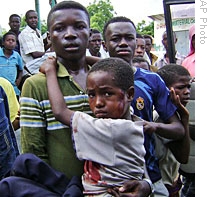Nairobi
17 June 2009
The police chief in the Somali capital, Mogadishu, has been killed as fighting continues to wrack the city. At least seven others were killed in clashes between Islamist insurgents and pro-government forces in the south of the city.
 |
| A Somali man carries a boy wounded during mortar shelling, 17 Jun 2009, in Mogadishu |
Mogadishu Police Chief Ali Said Hassan and a number of civilians were reported killed.
A spokesman for the Somali military said government soldiers responded after insurgents attacked government bases. But a spokesman for the Hizbul Islam militia, Muse Abdi Arale, said the government attacked first. He said pro-government forces and African Union peacekeepers attacked his militia's bases. He claimed AU peacekeepers fired mortars and heavy artillery, killing civilians.
More than 250 people have been killed since insurgents launched an offensive in the capital early last month, and the United Nations says 22,000 have been displaced.
The insurgents, including the al-Shabab and Hizbul Islam militias, say the internationally-backed government of President Sharif Sheikh Ahmed is not committed to an Islamist state, despite its efforts to introduce Islamic law in the country. The insurgents also say the government is too close to Ethiopia and the United States.
The government has control over only a limited area of the capital. With the help of 4,300 AU peacekeepers from Uganda and Burundi, the government still controls the main port and airport. The government has accused Eritrea of arming the insurgents, which include a number of foreign fighters, and the African Union has called for sanctions to be imposed on Eritrea.
The struggle between insurgents and pro-government forces continues to disrupt aid efforts southern and central Somalia.
The aid agency Doctors Without Borders says it is ending its operations in the Bakool region of central Somalia due to security concerns. Two of its staff members were abducted in the region in April. They were released, but the group's Coordinator of Operations for Somalia, David Michalski says the security threat in the area remains too high.
"They were held for 10 days and released. We still do not know who the perpetrators were or what their motivations were and this of course causes us some unease," he said. "We are willing to take risks as an organization, but we feel that it has stepped above the threshold of acceptable risk."
This is the fourth project Doctors Without Borders has had to close in Somalia in the past 14 months.
Meanwhile, the U.N. children's agency says al-Shabab continues to occupy the UNICEF compound in Jowhar, preventing the distribution of aid to women and children in the area.